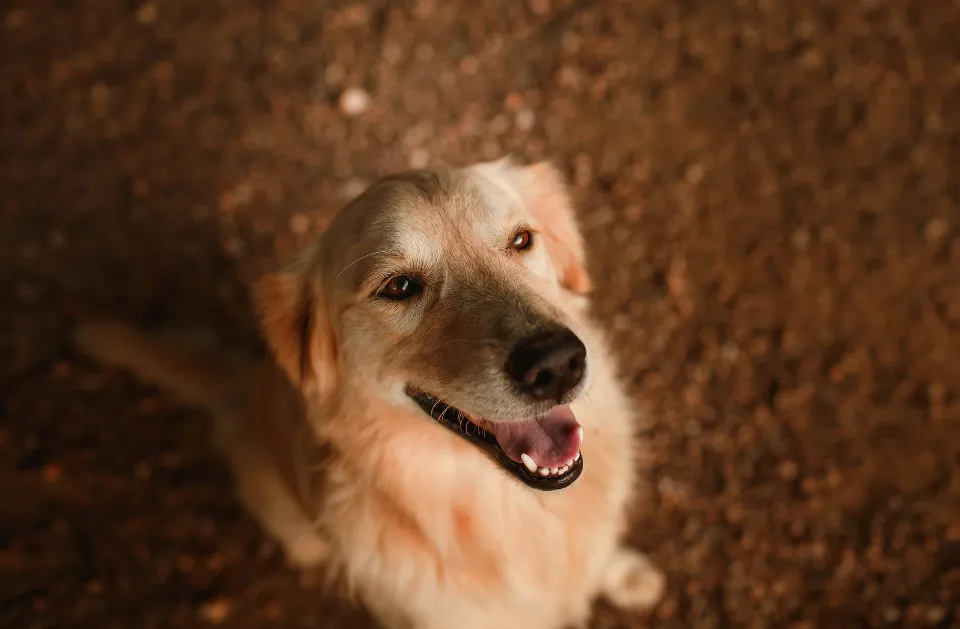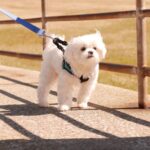We’ll delve a little deeper into the topic of whether or not your dog should avoid swallowing baby teeth in this article.
It can be overwhelming to comprehend some aspects of your puppy’s life, whether you are a seasoned parent or a newbie. It’s important to keep an eye on his training development, walking, feeding routine, and housebreaking.
Then there is the teething issue, which causes many parents to freak out. For both you and the poor puppy, the teething stage is unquestionably the most painful. You may find the nibbling, biting, and discomfort unsettling.
Of their 28 baby teeth, puppies typically swallow 14 of them. If they fall out while the puppy is eating or drinking, loose baby teeth are frequently swallowed. Having some idea of what to anticipate when teething can be useful. We discuss baby teeth in this manual, particularly if your puppies do swallow them.
Do Puppies Swallow Their Baby Teeth?
You anticipate finding teeth all over the place when your puppy starts the dreaded teething stage. Thus, it can be extremely alarming when you don’t.
Don’t, however, go on a search-a-thon when you notice that your pet is missing a few teeth. It might simply be the case that the adorable animal ate the teeth.
Baby teeth usually start to erupt by the second month of your puppy’s life. Some begin to manifest as early as one month, while others do so slightly later. All of the deciduous teeth ought to be in place by the second month.
They should begin to separate after two months. When teeth become loose, the process begins. As others take their place, they eventually split apart.
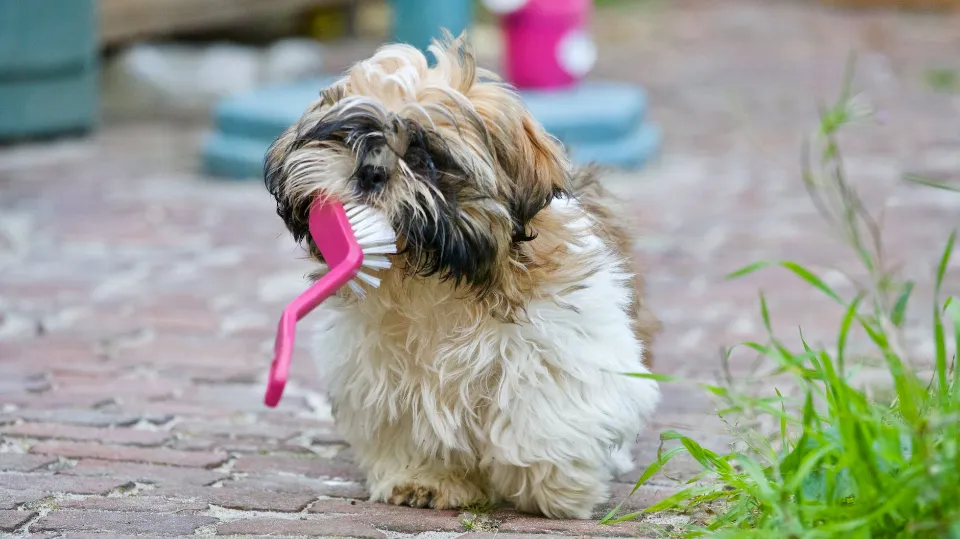
The six front teeth that make up your dog’s incisors—those used for self-grooming—are the first to fall out. As permanent canine teeth erupt to replace them, the canine or fang teeth come next.
Sometimes puppies unknowingly swallow their baby teeth. Perhaps the puppy’s tooth fell out while it was eating and was swallowed with the food. Sometimes the puppy’s teeth fall out while it is busy chewing on a toy or a bone, fooling it into thinking it is a treat or something.
Is It Dangerous If a Puppy Swallows Baby Teeth?
If a puppy eats its baby teeth, it won’t be dangerous. It’s pretty common and normal for puppies to accidentally swallow their own teeth, as it happens to many of them. Typically, a puppy won’t even be aware that it has destroyed a tooth because its baby teeth are so small.
Baby teeth pass through a puppy’s digestive system harmlessly and are excreted when the pup goes to poop several hours later.
Further Reading:
- Why Are Puppy Teeth So Sharp? Reasons & Care
- Are Puppies Born With Teeth: When Do They Have Teeth?
- Do Puppy Teeth Fall out? When & What To Do
Do Puppies Lose Their Fang Teeth?
To begin with, fang teeth are protruding, long teeth that are used for grasping and holding objects. Basically, a puppy has two fang teeth on each jaw, making up its four fang teeth. They are frequently referred to as canine teeth.
The mouth of a fang tooth bearer is very obvious. Compared to the rest of your puppy’s teeth, they are longer and more pointed. Even though they are smaller and sharper, they share a striking similarity with adult canine teeth.
All of a puppy’s baby or deciduous teeth fall out around the age of four months. During the cleanup, if you see sharp, pointed teeth anywhere in your home or compound, just know that the beauties have fallen out.
Don’t worry; stronger, permanent substitutes with the same design will take their place soon. The fang teeth usually fall out when the puppy is 4-6 months old. Usually, at the same time, premolars are the next to fall out. Molars arrive last, at a time of about 5-7 months.
The 42 permanent teeth on your adorable puppy should be present by the eighth month.
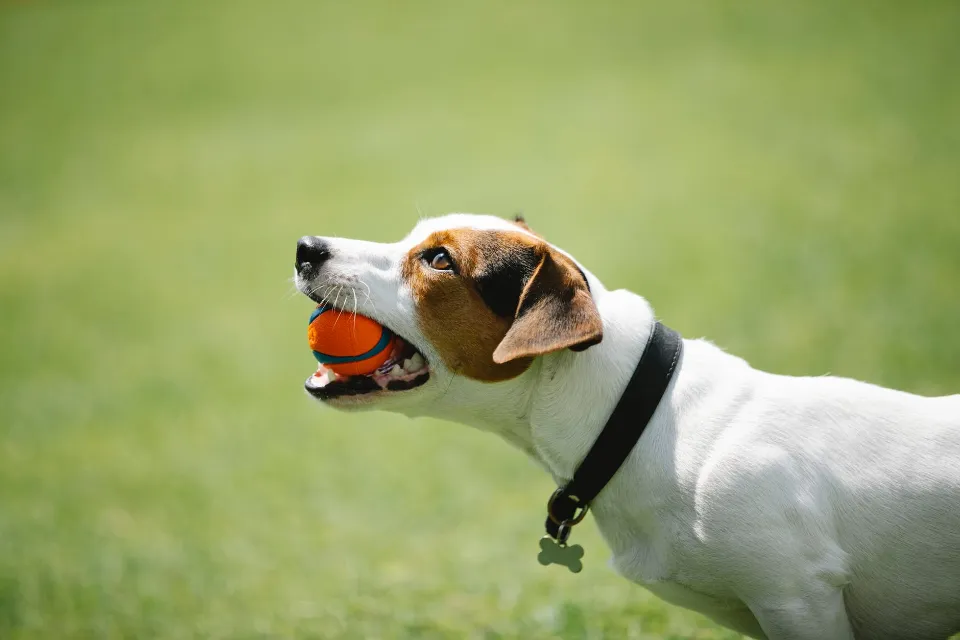
Signs Your Puppy is Teething
Because your puppy is unable to communicate with you, there will be times when you are unaware that your puppy is losing teeth. But if you do want to know when your puppy starts teething, there are some things you can watch out for such as:
Your Puppy’s Age
You can predict when your puppy will begin and stop teething by keeping track of their age.
Puppies lose their baby teeth between three and seven months of age. A puppy’s baby teeth will fall out and become loose during this period, and adult teeth will replace them.
Finding Blood on Chew Toys
When a puppy loses a tooth, its mouth bleeds a little until the blood clots. It may indicate that your puppy has loose or missing teeth if you notice some blood on his favorite toys or other chewable objects.
Finding Teeth Or Seeing Teeth Missing
Puppies occasionally do not swallow their teeth; instead, they may spit them out or leave them lodged in something they have been chewing on. If you start seeing sharp, tiny teeth lying around your house, your pup is definitely losing its teeth.
Even if you don’t find teeth lying around but you see a gap in your pup’s gums where a tooth used to be, it’s because your dog has lost a tooth and the adult replacement hasn’t grown out yet.
Frequent Drooling
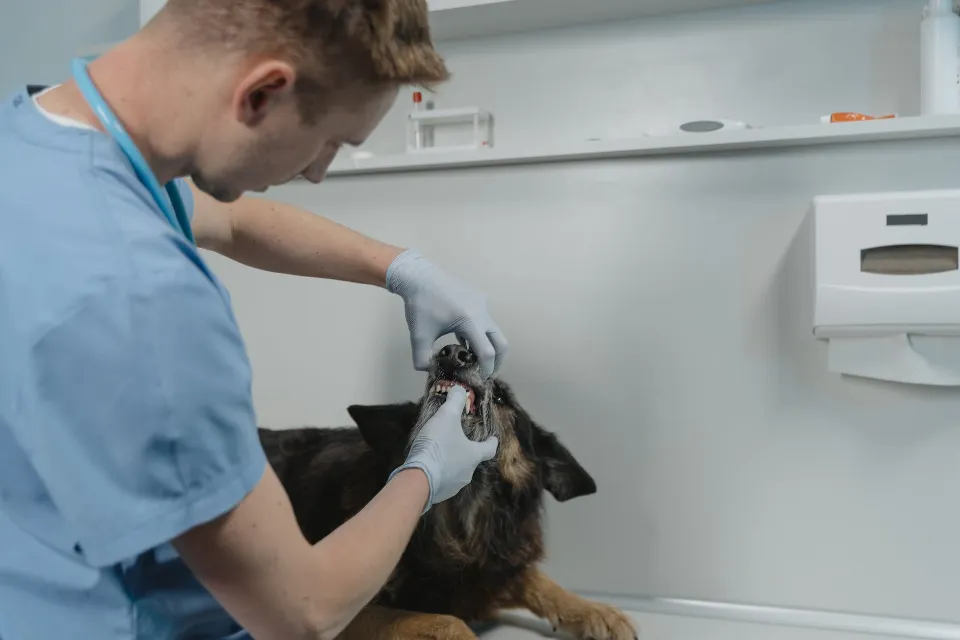
Contrary to what we might think from cartoons and family comedies, puppies aren’t inherently excessive droolers. If you notice your puppy drooling a lot more than usual, this is usually a sign your pup may have loose teeth.
Your puppy is drooling because its adult teeth are working to push out its baby teeth. This makes the gums and mouth sore to keep closed, so your pup keeps its mouth open, and drool has a chance to come out.
Whining and Pawing at the Face
While your puppy can’t talk and tell you about the pain, it has other ways of showing you that it’s hurting.
Two of the most common of these are whining a lot and pawing in the face. Both of these indicate that your puppy is in pain, and if your puppy is between the ages of six weeks and six months, the pain could very well be caused by teething.
A Decreased Appetite
If you’ve ever experienced a toothache, you understand how uncomfortable it is to eat when every bite hurts. Chances are you avoided eating anything other than soft foods until you felt better.
Puppies sometimes avoid eating when they’re losing teeth because eating hurts them, especially if all they get is dry food. Check your puppy’s teeth and think about soaking the kibble or giving your puppy wet food for a while if you notice a noticeable change in your puppy’s appetite that doesn’t appear to be related to digestive problems.
How to Help Puppies through Teething?
Although a puppy’s development must include the natural and healthy process of teething, there are things you can do to make a pup feel better during this trying time.

- Never pull loose teeth
- Buy the right toys
- Feed ice cubes
Do Puppies Cry When Teething?
The American Kennel Club (AKC) asserts that your cat will experience excruciating pain while teething. The puppy will have inflamed and painful gums as the old teeth fall out.
While some puppies go through the stage relatively calmly, many more cry when eating or playing with toys. Their pain is at its worst at this time. Some puppies will not only cry but also behave in an unusual way.
Unless the puppy acts excessively lethargic or completely refuses to eat, you shouldn’t worry. Contact a veterinarian if this occurs.
Do Puppies Vomit When Teething?
Vomiting by itself is not really a sign that a puppy is teething. A stomach ache, however, can occasionally occur. When this occurs, some dogs experience diarrhea and vomiting.
The practice of biting and chewing on anything and everything that might make the puppy ill can also cause vomiting. In light of the foregoing, your puppy shouldn’t throw up more than once per day. Take her to the vet if she vomits multiple times per day, is extremely weak, and refuses to eat or play.
Final Thoughts
Every puppy experiences the teething stage, and every puppy swallows a few baby teeth when they fall out.
This is completely safe, so don’t be concerned. If your puppy has a few new holes in his mouth but no teeth lying around, they might appear when he goes outside for a bathroom break.
A teething puppy can be difficult to manage. Any pet parent can go crazy worrying about where missing teeth go, dealing with the nipping and biting, and having their furniture destroyed.
FAQs
Do Puppies Stop Chewing When They Lose Their Baby Teeth?
Will my puppy ever stop chewing everything? is a common question during your puppy’s teething period. According to VCA Hospitals, the excessive chewing behavior of teething seems to subside when dogs reach 18 months of age. But your dog might continue to chew to some extent for the rest of his or her life.
What to Do When Puppy Loses Baby Teeth?
In general, the best thing you can do to help your puppy with the teething process is to provide it with plenty of toys to chew on. Puppies who are teething can cope with their discomfort by chewing, and if you don’t give them the right toys, they’ll turn to your furniture, shoes, and pillows.

